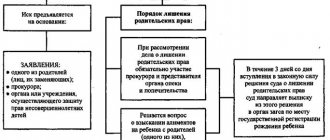In the modern world, the birth of a child in an officially unregistered marriage is not considered uncommon. Such a marriage has no legal force and the spouses can only be called cohabitants.
Popularly, such a union is known as a civil marriage. Since this is a fairly common phenomenon, the question remains relevant whether it is possible to register a child in the father’s surname if the marriage is not registered.
After all, the fate of the child and his material well-being may depend on this. Parental relationships work out differently and fathers are not always conscientious about fulfilling their responsibilities towards their children.
From the moment of his birth, any child acquires the right to a surname, first name and patronymic; it is enshrined in both international and Russian legislation.
The child receives a name by agreement of the parents or one of them . If it does not comply with the law, the registry office may refuse.
If a child has a father, he receives a middle name in accordance with his name; it cannot be chosen by the parents. The surname also cannot be assigned to any name; it is determined by the details of the spouses.
General procedure
The question of what the child’s surname will be if the parents have different surnames most often arises when the relationship between mother and father is not officially registered. In this case, you should act in accordance with the requirements of legislative acts.
The surname is given to the child when registering his birth at the registry office. After this, a birth certificate is issued containing this information.
If the legislation of the subject does not provide for a different procedure for obtaining a surname, then the baby is given the surname of either the mother or the father.
Before the changes were made, a child could receive a double surname only if one of the parents had it.
In the case of using a double surname, it is prohibited to use a different order of accession when forming the surname of siblings.
Sometimes it happens that the father and mother cannot independently reach agreement on the child’s first and last name. Then the dispute is resolved by the guardianship authorities. In their decision, they must be guided by the interests of the minor and take into account various factors, including the euphony of these data. If a newborn is left without parents, his last name and first name are given to him by his legal representatives in accordance with the general procedure.
When a baby is born in a marriage, it is automatically registered in the name of both parents: the spouse’s initials are written in the “father” column, and the spouse’s in the “mother” column.
However, if a child is born out of wedlock, complications arise. In this case, instead of an entry in the paternity column, a dash is placed, which is why the blood father is not considered such in the eyes of the state.
Some citizens believe that this problem can be solved by initiating an adoption procedure.
However, such a judgment is fundamentally incorrect. The citizen from whom the child was born is his blood parent.
Reference! According to the law, the blood father does not have the right to adopt his own son.
If the baby was born in cohabitation, a different procedure is required. In this case, the institution of adoption does not apply. It is necessary to establish the paternity of the baby.
To do this, it is enough for citizens to mutually apply to the registry office or, in case of difficulties, to the court. But the blood father cannot adopt his own child.
The legislative framework
According to the code, if there are both parents, children can be given any surname at birth, by agreement between them. If adults cannot agree, then this issue is resolved with the involvement of the guardianship and trusteeship authorities.
When a baby is born out of wedlock, the assignment of a surname follows different rules.
The procedure for a child to receive it is described in Article 58 of the Family Code, as well as Art.
18 of the Federal Law “On Acts of Civil Status”. The following surname options are allowed for children:
- from mother;
- from father;
- double.
In any case, the surname cannot be entered arbitrarily at the sole request of the mother or father. There must be a legal basis for this, as well as official confirmation.
If the parents are dead or deprived of their rights, then the children’s full name is given to their substitutes (trustees, guardians, relatives). Upon adoption, the newborn is registered in the surname of his new family.
Registration of newborns is carried out by the civil registry office at the place of residence of the family. If there is no such branch in the village (city), then you can contact the nearest one. Entries are made upon presentation of the following documents:
- certificates from the maternity hospital (other medical institution);
- application for registration;
- passports of children's representatives;
- marriage certificate (or document acknowledging paternity).
You must receive a certificate for children within thirty days of their birth. This procedure is completely free. You only need to pay for the re-issuance of this document.
The procedure for assigning a surname to a child if the parents did not register their relationship
In the modern world, people are in no hurry to officially register their relationships and often give birth to children in such a union. In this case, the question inevitably arises: is it possible to give the child the father’s surname if we are not registered. The legislation, which is also in force in 2021, allows us to solve this problem.
If at the time of the baby’s birth, mom and dad did not register their relationship, the child can be given the surname of one of them. To make a record of the father, paternity must be officially recognized. To do this, the father must write a corresponding statement. If the relationship is not registered, the parent is not required to go through the adoption procedure.
It is more difficult when the father is not listed in the documents at all. In this case, the surname is written in accordance with the full name of the baby’s natural mother. The patronymic name is set whatever the woman wishes.
Establishing the baby's initials is one of the many problems that arise when he is born in a civil marriage. Another difficulty is establishing paternity, especially if the blood parent does not recognize his child.
If a man does not want to acknowledge his paternity, an entry about the father can be made by a court decision. Thus, the child can be given the father's surname if the marriage is not registered.
In the event that paternity has not been established at the time of issuing the birth certificate, the baby will receive the mother's surname. Once paternity is established in court, it can be changed. When a child is born out of wedlock, it is important to take into account that if the parent recognizes the child as his own, his presence when receiving the birth certificate is mandatory.
When a child is born out of wedlock, it is important to take into account that if the parent recognizes the child as his own, his presence when receiving the birth certificate is mandatory. Because he must write a paternity statement. Otherwise, the fact that the child has a father will not be confirmed and the child will receive the mother’s surname.
Birth of a child
For the status of a newborn, in particular, determining what surname he will bear, it is of great importance whether he was born in or out of wedlock. In the first case, he will immediately have a father, and when registering at the registry office, they immediately look for this. In the second, the father will need to recognize him as his own, and the status differs depending on whether this recognition is made or there is a court order in this regard - accordingly, he will not always be able to bear his father’s surname.
Married
When getting married, there are four options for creating the surnames of spouses:
- Traditional - the wife takes her husband's surname.
- Reverse – the husband takes his wife’s surname; it can be used, for example, if the woman’s surname is more euphonious, and the man himself wanted to change his, or it could be a requirement of his wife’s family, which he agrees to agree to.
- No change - for both spouses it remains the same.
- Connecting two surnames with a hyphen.
This choice is important for what surname the baby will bear in the future, because if he appears in an officially registered union, there will be no questions about who his parents are, and his surname must match theirs. If it is common, then there is no choice, but if the spouses wear different ones, he can get any of them.
Note!
A special case is adoption from an orphanage. In this case, the full name of the adoptee changes.
Outside of marriage
If the baby was born out of wedlock, the child's surname depends on establishing paternity. If it is established, the choice will be the same as at birth in marriage - he can be given the surname of either parent. But if paternity is unknown, he will in any case bear his mother’s name. Then it can be changed if paternity can be proven in court.
Establishing paternity is important because even a child born outside the family, if his relationship with his father is proven, will have all the same rights as a legitimate child. Both parents will also have to bear responsibility for it and participate in its provision, which is usually expressed in the obligation to pay child support for the parent living separately.
How to register a child in the name of the father if he was born out of wedlock
If the citizen who is the father of the child is known, to register him it is necessary to go through the procedure of establishing paternity. It is different from adoption. Citizens, if there is mutual agreement, can take one of the following paths:
- After the minor is born, both his parents must appear at the registry office . An application regarding the recognition of the baby is submitted to this institution. After all the nuances have been settled, the relevant data will be entered into the birth certificate.
- You can apply before birth. In this case, both citizens must simultaneously appear at the registration authority and draw up the appropriate document.
Important! If a citizen dies during birth or is declared legally incompetent, the father must contact the guardianship authority.
When contacting the guardianship authority, you will need to provide substantial evidence of the relationship and submit a request to include initials in official documents for the child. If an employee of this institution takes into account the citizen’s arguments, he will be recognized as the father of the baby.
Another way to register a minor as a father is to officially register the relationship. In this case, a marriage union is established between the spouses and the issue of paternity of the baby is resolved.
Change after divorce
As a rule, if parents decide to divorce, the children remain with their mother. As a result, it may be necessary to change the last name to the same one she bears. This significantly simplifies the preparation of some documents due to the fact that there will be no need to additionally prove kinship.
It is possible to carry out this change, however, sometimes certain complications may arise. There are two main options for the procedure, depending on the age of the child:
- If he is under 14 years old, then the decision on this is made by his parents (from 10 years of age his consent will be required).
- If he is 14, then he makes the decision himself, although he will need parental consent. The key difference is that you will not need to obtain the consent of the guardianship authorities, and the whole procedure will be easier as a result.
Important!
A teenager has the right to make changes to his full name without parental consent from the moment of emancipation. Or you need to wait until you reach the age of majority, after which the citizen is free to do whatever he wants with his full name.
There will be no problems if both mom and dad agree to the change. But if the parent living separately is against it, then this issue will have to be resolved in court, proving that the change will benefit the child.
Although not in all cases the consent of the parent who lives separately is necessary - only if he takes part in raising and providing for the child, that is, fulfills his parental functions. His consent is not required if:
- It will be proven that he evades them, for example, does not pay alimony.
- He has been deprived of parental rights.
- Recognized as incompetent.
- It is unknown where he is - that is, he is not at his place of registration, and they cannot give information as to where to look for him. Obviously, in this case it is difficult to obtain his consent to change his surname.
The format is as follows:
- An application is submitted to the guardianship authorities - to indicate consent, both parents must submit it. If it is not there, the guardianship authorities will have to make a decision in favor of one of them, and if the second one does not agree with it, then it will be able to appeal the decision in court.
- After completing this stage, with the decision of the guardianship authorities or the court in hand, as well as other necessary documents, you need to contact the registry office, where the change will be registered. For teenagers 14 years and older, the procedure begins immediately with this step.
After registration is completed, you will need to replace all documents that use the child’s previous full name, because changing them will make these papers invalid.
What surname will the child get if the father is absent?
When a child is born out of wedlock, the father's surname is assigned only with his consent and recognition of paternity. If a parent does not want to admit the fact of relationship with the baby, this can be done during the trial.
Formation of a family relationship leads to the emergence of certain rights and obligations. In a situation where the father of a newborn dies or the parents are divorced, the child can receive the father's surname if no more than 300 days have passed since the date of death or divorce.
During this time, paternity is recognized automatically and can only be revoked by a court. The surname may change if paternity is disputed in court and the plaintiff's claims are satisfied. A single mother has the right to give her child her last name. The child also receives a first and patronymic at the discretion of the mother.
Is it possible to give my mother's last name?
Yes, this is possible regardless of whether the baby was born in wedlock or not. In the first case, the parents themselves must agree among themselves, and everything will depend on their choice - the child can bear both the surname of the father and mother, or a double one.
Additional Information
If one of the parents already has a double, it is no longer possible to turn it into a triple by adding something from the second parent to it.
In case of birth without registration, for example, in a civil marriage, the situation will be different: the father’s consent for the mother to give the child her last name will not be required. On the contrary, it will be needed to take my father’s.
If one of the parents does not want to carry out the paternity procedure
It is not always possible to solve a problem peacefully. The question arises: if a child was born out of wedlock, how can he be registered with the father when the latter refuses to recognize consanguinity? In this case, the mother must file a lawsuit to establish paternity. You should contact the magistrate.
Attention! The blood parent can also file a claim to be recognized as the child’s father.
In rare cases, the mother of the baby does not want to admit the fact of paternity . Such situations arise due to various circumstances, such as enmity, hatred between citizens, reluctance in the future to contact the blood father of a minor.
However, these subjective factors cannot become an obstacle to protecting the rights of the child. Therefore, a citizen can file a lawsuit with a corresponding demand. But in this case, a biological examination may be required.
How to get a double surname when registering a marriage?
To get married, future spouses submit a joint application, indicating which surname will remain with them after the marriage is registered.
Important! You do not have the right to refuse to assign a double surname, even if it sounds dissonant or consists of long parts. But when choosing, it is better to analyze everything carefully from an aesthetic and practical point of view.
The step-by-step algorithm looks like this:
- Fill out the application, submit documents at least 1 month before the planned wedding date, but not earlier than 1 year.
- Appear for state registration, sign the document, and receive a certificate.
The marriage registration certificate is issued one for two, it indicates the pre-marital and new surnames of the parties.
Lawyer's advice: you can submit your application through State Services, saving 30% of the state fee and your time. After registering your application, you will only have to submit your passports to the registry office a few days before the wedding.
Documentation
To obtain a double surname when registering a marriage, you must provide passports and a general application. If one is divorced or a widower, you will need a certificate of divorce, a certificate of death of the former spouse.
Statement
The application is filled out according to Form No. 7, approved by Order of the Ministry of Justice No. 201.
Data indicated in the application:
- Information about future spouses: full name, passport details, dates of birth, registration addresses;
- Education, citizenship, links to documents confirming the termination of previous marriages;
- Request to assign specific data to spouses (at the end of the document);
- Date of compilation, signatures of the parties.
When submitted to State Services, the application is completed electronically. There you can also select the registry office department, the date and time of the wedding.
Sample application for marriage according to form No. 7:
State duty
For a change upon marriage, a fee of 350 rubles is paid. When applying through Gosuslugi, the amount will be 245 rubles.
Possible problems if mother and child have different surnames
If the child and mother have different last names, difficulties may arise after divorce or the death of the father. First of all, the problems will be related to the obviousness of the family connection.
To avoid this, you need to enter information about the newborn in the mother’s passport in the “children” column. This can be done at the passport office by presenting the child’s birth certificate. Difficulties may arise when contacting various authorities. Therefore, you should have with you a complete package of documents that confirms the change of surname by the mother and the fact of the relationship with the child. The following documents are required as confirmation:
- Child's birth document.
- Divorce document with a note about the mother's change of surname.
- Marriage document if the mother got married again and changed her data.
- A marriage certificate received from the registry office, which confirms the existence of a marriage relationship in the past.
In the case of different surnames of the mother and child, there may be problems when traveling abroad with a minor. In such a situation, you should also carry documents with you that confirm the existence of a relationship.
To avoid additional difficulties, you need to have an official translation of the child’s birth certificate. This can be done at the consulate of the country you plan to visit. Thus, if parents have different surnames, then the child can receive the surname of either mom or dad.
If at the time of the birth of the child the mother and father are not in an officially registered marriage, then the newborn can be given the father’s surname. To do this, the father must write a statement of paternity, on the basis of which information about him will be included in the child’s birth document. If a parent does not recognize his paternity, this can be done in court, in which case the child can also receive the father's surname.
Best answers
Victoria: Your last name, and your patronymic is similar to the child’s name. PS Single mother is a legal term and that’s all. You will never be lonely again, there are two of you: YOU AND YOUR BABY. HAPPINESS TO YOU.
Hummer: Neighbor.
[email protected] : Your last name is better, of course. But the middle name... whatever you want, the choice is yours! ) Good luck
Sharkina Alla: They usually give their last name, and their middle name is whatever you want.
Senkevich Ksenia: register correctly with the registry office. my. yours.
DAUGHTER OF NIKOLA PITERSKY: Any patronymic... even Beria... but only her own surname... they won’t give you any other name without a dad...
Freken Bock: give me yours, and come up with a middle name, or ask for the father (child)
karasavitsa: If the father does not participate in any way in the registration of the child, everything is at your choice. Give yours, or your mother’s maiden’s, to prolong the family, for example... Middle name is your choice.
Tigran Galechyan: Let it be Evgenievich
Anna BLAGODAT: The surname is given only to the mother in this case. And the middle name is any, but it’s better still the child’s father. Still, it will be imprinted on fate, karma.
Oksana: Well, give me your father’s middle name, guess what, remember his name?
O. Bender: What does it mean, what surname, he was born without a mother, or something... Your surname, patronymic is optional, but if you remember the name of the expected father, then everything happens in life, and this will be fair...
Nadezhda Kozachenko: Your last name, of course! And your middle name... you can give your father's middle name...
Dear Ya Mila: The child’s last name will be yours and only yours, but you can give your middle name or whatever you want. Or you can put a dash in the column.
Sashenka: Your last name, and any middle name, you can use your father’s name, you can use your father’s name, you can come up with one!!!!
Tatyanka: your last name, patronymic - “his”. AFTER THE WITNESS, GO TO COURT AND APPLY FOR ALIMONY... THERE MUST BE WITNESSES THAT YOU HAVE DETECTED OR LIVED, PHOTOS OF YOU WITH HIM...
Yulia Remennikova: So you want to be a single mommy: ? well it's at your discretion
Al.Di Sasha (I love Dianochka): The surname is given by the mother’s surname, and the patronymic by the name of the person indicated by the woman as the father of the child. And if you don’t want the child to bear his father’s middle name, give any middle name you like or whatever yours is
Anatoliy Rizayev: it depends on your relationship with your father. Of course it would be better if there was both a father and his patronymic. but the final choice is yours.
Ekaterina: your last name, and your middle name - whatever you want










